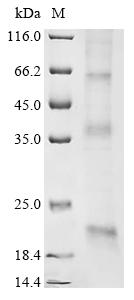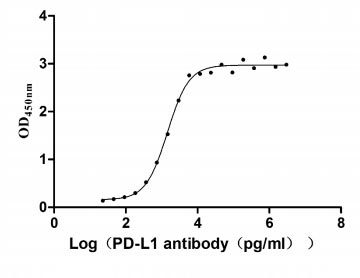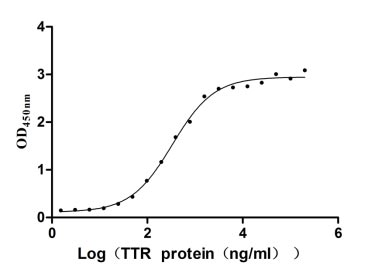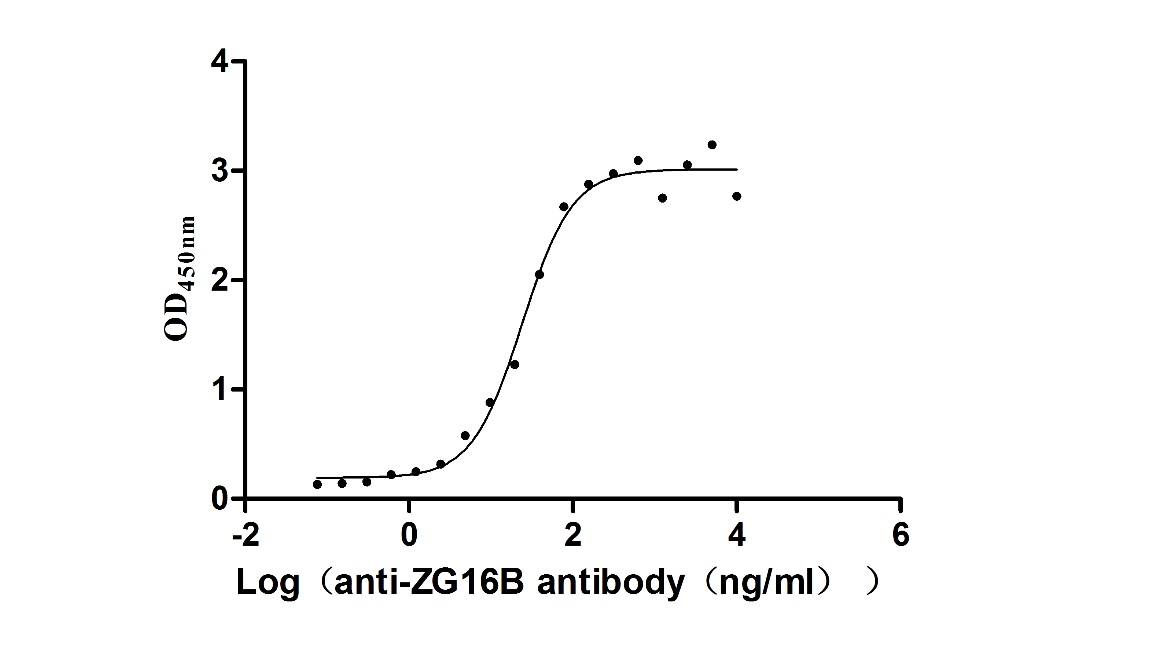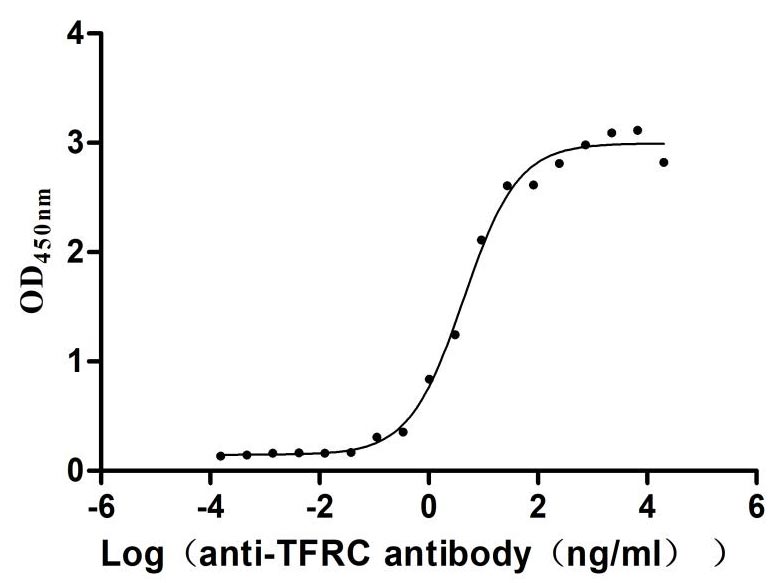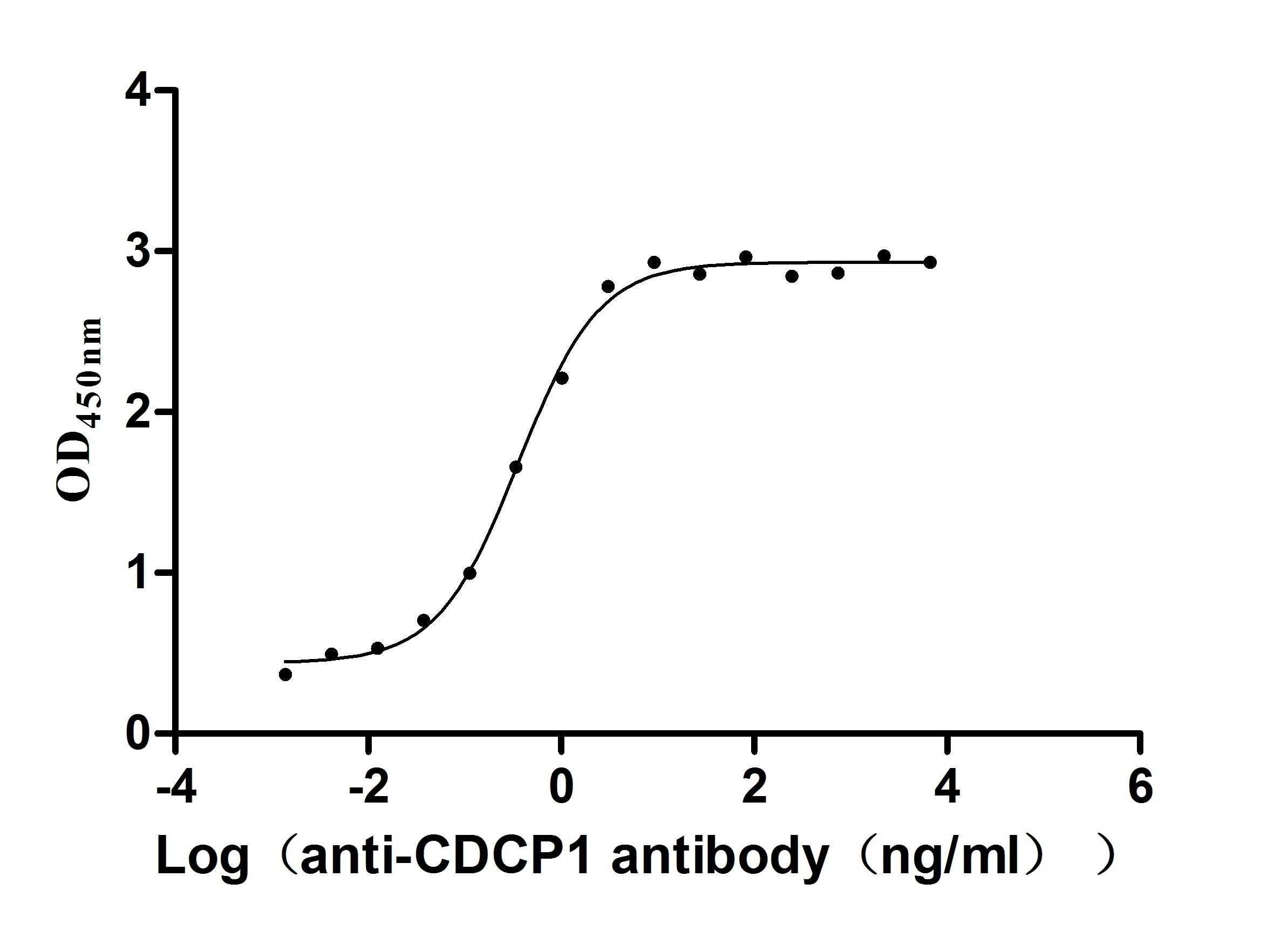Recombinant Human Claudin-11 (CLDN11)
In Stock-
货号:CSB-CF005492HU
-
规格:¥9720
-
图片:
-
其他:
产品详情
-
纯度:Greater than 85% as determined by SDS-PAGE.
-
生物活性:Not Test
-
基因名:CLDN11
-
Uniprot No.:
-
别名:(Oligodendrocyte-specific protein)
-
种属:Homo sapiens (Human)
-
蛋白长度:Full Length
-
来源:in vitro E.coli expression system
-
分子量:23.5 kDa
-
表达区域:1-207aa
-
氨基酸序列MVATCLQVVGFVTSFVGWIGVIVTTSTNDWVVTCGYTIPTCRKLDELGSKGLWADCVMATGLYHCKPLVDILILPGYVQACRALMIAASVLGLPAILLLLTVLPCIRMGQEPGVAKYRRAQLAGVLLILLALCALVATIWFPVCAHRETTIVSFGYSLYAGWIGAVLCLVGGCVILCCAGDAQAFGENRFYYTAGSSSPTHAKSAHV
Note: The complete sequence including tag sequence, target protein sequence and linker sequence could be provided upon request. -
蛋白标签:N-terminal 10xHis-tagged
-
产品提供形式:Liquid or Lyophilized powder
Note: We will preferentially ship the format that we have in stock, however, if you have any special requirement for the format, please remark your requirement when placing the order, we will prepare according to your demand. -
缓冲液:If the delivery form is liquid, the default storage buffer is Tris/PBS-based buffer, 5%-50% glycerol. If the delivery form is lyophilized powder, the buffer before lyophilization is Tris/PBS-based buffer, 6% Trehalose.
-
复溶:We recommend that this vial be briefly centrifuged prior to opening to bring the contents to the bottom. Please reconstitute protein in deionized sterile water to a concentration of 0.1-1.0 mg/mL.We recommend to add 5-50% of glycerol (final concentration) and aliquot for long-term storage at -20℃/-80℃. Our default final concentration of glycerol is 50%. Customers could use it as reference.
-
储存条件:Store at -20°C/-80°C upon receipt, aliquoting is necessary for mutiple use. Avoid repeated freeze-thaw cycles.
-
保质期:The shelf life is related to many factors, storage state, buffer ingredients, storage temperature and the stability of the protein itself.
Generally, the shelf life of liquid form is 6 months at -20°C/-80°C. The shelf life of lyophilized form is 12 months at -20°C/-80°C. -
货期:3-7 business days
-
注意事项:Repeated freezing and thawing is not recommended. Store working aliquots at 4℃ for up to one week.
-
Datasheet & COA:Please contact us to get it.
相关产品
靶点详情
-
功能:Plays a major role in tight junction-specific obliteration of the intercellular space, through calcium-independent cell-adhesion activity.
-
基因功能参考文献:
- expression of claudin-11 in cutaneous squamous cell carcinoma (cSCC) cells depended on the activity of p38delta MAPK; knock-down of claudin-11 enhanced cSCC cell invasion PMID: 27992079
- s demonstrated that CLDN11 promoter hypermethylation is a frequent event in LSCC, and contributes to metastasis and progression of LSCC. PMID: 28743857
- The expression of claudin-11, -23 was remarkably downregulated in gastric cancer. PMID: 28350854
- Claudin-11 might represent the essential component of the blood-testis barrier in human. PMID: 27486954
- the expression of miR-99b was inversely correlated with CLDN11 levels . These findings suggest that a high level of miR-99b expression is an independent prognostic factor and correlates with poor survival of patients with Hepatocellular carcinoma (HCC) PMID: 26134929
- CLDN11 is an epigenetic biomarker for malignancy in dysplastic nevus and melanoma. PMID: 24999589
- these data suggest that cancer cells may induce CLDN11 overexpression and subsequent collective migration of peritumoral CAFs via TGF-beta secretion. PMID: 24268521
- The expression of claudin-11 was up regulated in gastric cancer tissue. PMID: 23919729
- The spatial organization of claudin-11 and connexin-43 is altered in men with primary seminiferous tubule failure. PMID: 23706332
- disorganization of claudin-11 expression in Sertoli cells might be one of the factors involved in the impairment of spermatogenesis. PMID: 22951003
- Treatment with 3-deazaneplanocin A, an inhibitor of H3K27 methyltransferase, attenuated CLDN11 induction by serum stimulation in parallel with sustained miR-1275 expression PMID: 22736761
- claudin-11 may have a role in preventing cancer progression and may serve as a therapeutic target in reducing metastasis PMID: 21468549
- late spermatogenic wave may negatively regulate claudin-11 gene activation and the subcellular localization of claudin-11 in Sertoli cells, thus altering the blood testis barrier in the human testis PMID: 20850723
- Claudins 11,expression in meningiomas. PMID: 20546350
- hypermethylation of CLDN11, leading to downregulated expression, contributes to gastric carcinogenesis by increasing cellular motility and invasiveness PMID: 19956721
- Contribution of the tight junction protein CLDN11 to barrier function in endothelial cells is novel and may reflect hemodynamic requirements of the corpus cavernosum. PMID: 19622796
- Data demonstrate that in rhesus monkeys immune responses directed at human OSP are encephalitogenic, leading to inflammatory responses throughout the central nervous system and to selective demyelination of the optic nerve. PMID: 18412169
- the disruption of the blood-testis barrier is related to a dysfunction of claudin-11 and not to a failure of its expression. PMID: 19241088
显示更多
收起更多
-
亚细胞定位:Cell junction, tight junction. Cell membrane; Multi-pass membrane protein.
-
蛋白家族:Claudin family
-
数据库链接:
HGNC: 8514
OMIM: 601326
KEGG: hsa:5010
STRING: 9606.ENSP00000064724
UniGene: Hs.31595
Most popular with customers
-
Recombinant Human Programmed cell death 1 ligand 1 (CD274), partial (Active)
Express system: Mammalian cell
Species: Homo sapiens (Human)
-
Recombinant Human Transthyretin (TTR) (Active)
Express system: Mammalian cell
Species: Homo sapiens (Human)
-
Recombinant Macaca fascicularis zymogen granule protein 16 homolog B (ZG16B) (Active)
Express system: Mammalian cell
Species: Macaca fascicularis (Crab-eating macaque) (Cynomolgus monkey)
-
Recombinant Human Transferrin receptor protein 1 (TFRC), partial (Active)
Express system: Mammalian cell
Species: Homo sapiens (Human)
-
Recombinant Human CUB domain-containing protein 1 (CDCP1), partial (Active)
Express system: Mammalian cell
Species: Homo sapiens (Human)
-
Recombinant Human Dipeptidase 3(DPEP3), partial (Active)
Express system: Mammalian cell
Species: Homo sapiens (Human)

